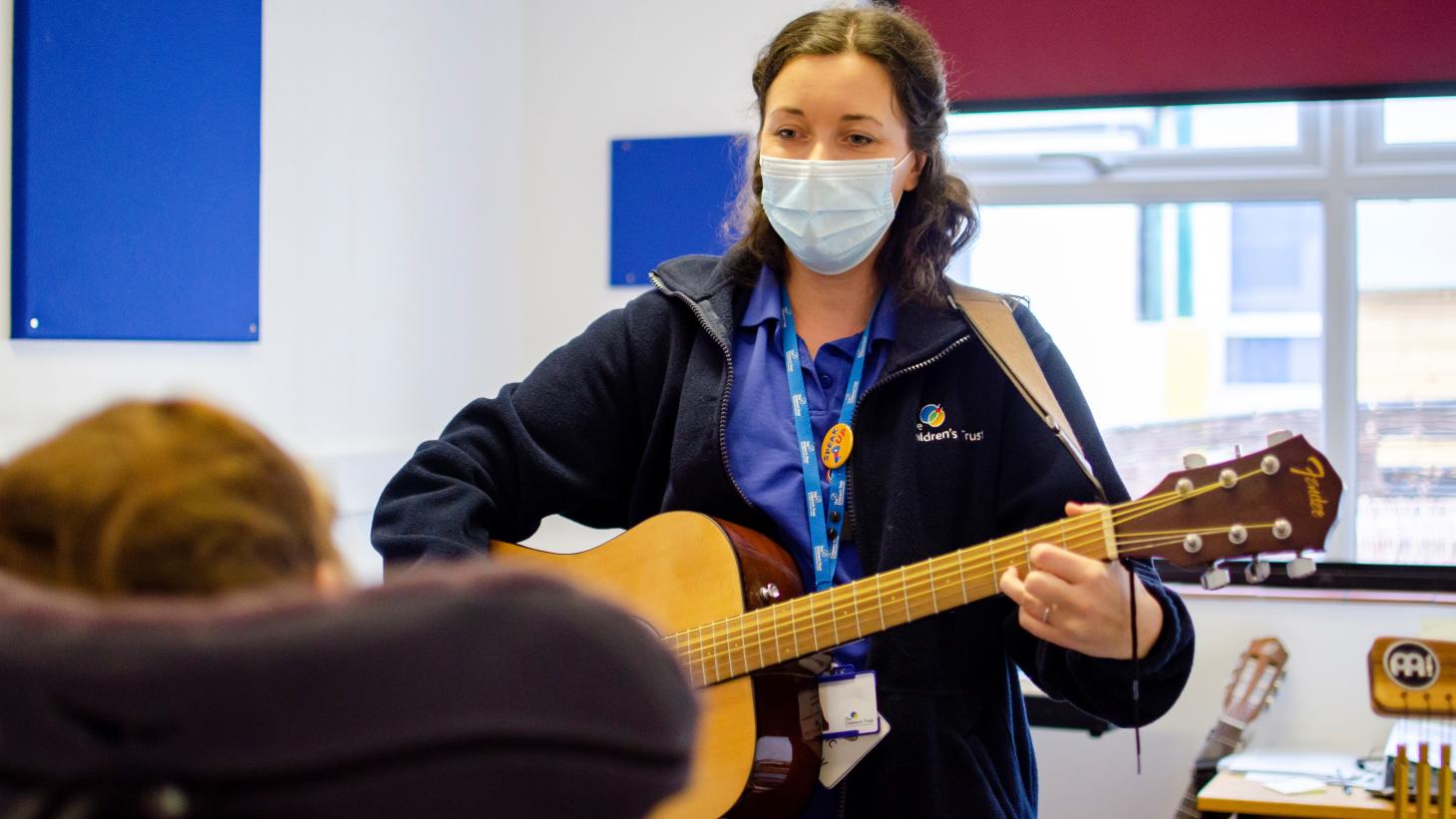What is music therapy?
Music therapists use music as the primary tool to connect and communicate.
Music therapy is an established psychological clinical intervention, delivered by HCPC [Health and Care Professions Council] registered music therapists to help people whose lives have been affected by injury, illness or disability through supporting their psychological, emotional, cognitive, physical, communicative and social needs.
- British Association of Music Therapists (BAMT), 2023
Music therapists use music to work towards therapeutic goals. It is a particularly powerful intervention for those who have difficulties communicating verbally.
Our music therapy provision
Individual music therapy sessions
Pupils at The Children’s Trust school have access to weekly individual music therapy. The sessions are person-centred and tailored to the individual. The therapist will use a variety of interventions depending on the needs of the pupil and how they present in the session.
Developing and nurturing the therapeutic relationship between therapist and pupil is vital to the process. Sessions are held at the same time and place each week, with the same therapist, providing consistency for the young person.
Group music therapy
Group music therapy sessions at The Children's Trust School are based in the school hall. These groups give young people the opportunity to interact with peers outside of their class group, working on collective aims.
Referral Process
Some pupils have music therapy provision on their Education, Health Care Plans (EHCP). Others can be referred for individual or group music therapy by their teacher/therapist/carer or parent.
Interventions and aims
Music therapists use a wide range of therapeutic interventions such as:
- Musical improvisation
- Song writing and recording
- Structured songs
- Singing and vocal work
- Interactive musical play
- Musical listening
- Intensive interaction techniques
- Reflecting mood through music
- Developing playlists
Some examples of music therapy aims include:
- To develop turn-taking skills with a view to increasing opportunity for social interaction.
- To communicate a preferred choice, helping to increase autonomy and independence.
- To build confidence through improvised music making with others.
- To encourage tone relaxation through music listening and participation.
- To develop awareness of cause and effect through musical interaction.
MATADOC assessments
Our music therapists are trained to carry out Music Therapy Assessment Tool for Awareness in Disorders of Consciousness (MATADOC) assessments.
The MATADOC is a standardised diagnostic music-based measure which assesses and evaluates levels of awareness for young people with disorders of consciousness. It can also be used with those with profound developmental disabilities.
The results of these rigorous assessments are shared with the wider multidisciplinary team, family and carers and are used to inform further clinical work.
Multi-disciplinary working
At The Children's Trust School, the music therapists are situated within the school therapy team. Music therapy can be used collaboratively with other therapeutic modalities. For example, with physiotherapy, occupational therapy, speech and language therapy and play specialism.
Speech and language therapy
It is well documented that music is the foundation of communication and crosses all barriers. At The Children’s Trust, the Music Therapists and the Speech and Language Therapists work collaboratively to provide our CYP [children and young people] with opportunities to communicate, develop self-expression, and social interaction skills.
Music Therapists and the Speech and Language Therapists work collaboratively together as both music and language have pitch, rhythm, and durational features, which support language acquisition, social-communication skills, language concepts, oral motor skills, and breath control.
Occupational therapy
There are many ways occupational therapy can work with Music Therapists here at The Children's Trust. At the start of the session, we will ensure the young person is in the best position to independently engage in the session and can explore alternative positions. We will assess the environment and make changes if needed, to support their sensory systems and help them best engage and focus on the session.
Music therapy can also help Occupational Therapists to explore music to help manage their regulation, which can then be incorporated as part of their regulation strategies, to help keep them feeling safe and happy throughout their day. We will work together to help support the young people to best access the instruments, independently and with assistance. Working collaboratively with the Music Therapist is incredibly valuable.
Physiotherapy
Having the opportunity to complete joint sessions with our Music Therapy colleagues has been invaluable. One of our students has historically struggled to tolerate weight-bearing, however with weekly support from Music Therapy he has been engaging much better in sessions and we have been able to gradually increase the angle at which he stands. He is now able to comfortably manage 20 minutes in an upright position, which enables him to engage in physical activity and will aid his overall health and wellbeing.

